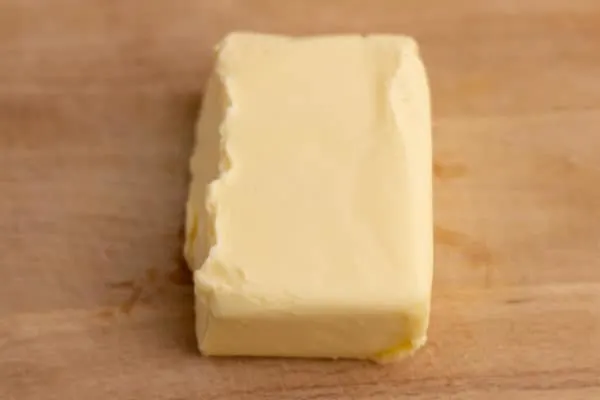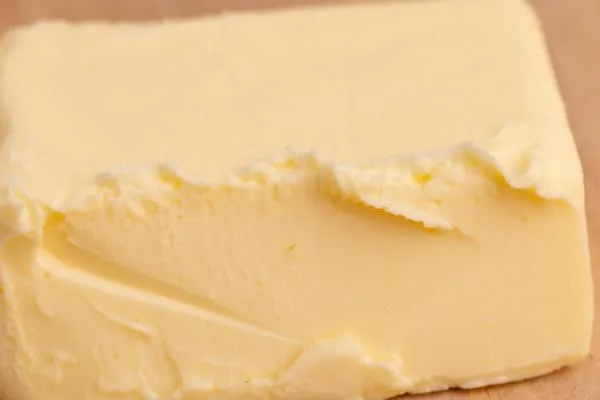Here’s all about the shelf life and spoilage of butter. Learn how long butter lasts and what are the spoilage signs.
Don’t use butter all that often and wonder how long butter actually lasts?
Or maybe your butter stick has changed color a bit, and you’re not sure if it’s still okay to use. How do you tell if butter is bad?
If either sounds familiar, you’re in the right place. Read along.

How Long Does Butter Last?
Butter has a shelf life of several weeks and lasts an extra week or two past the printed date if continuously refrigerated. However, if you leave it on the counter, it’ll keep quality for 1 to 2 days and turn rancid within less than a week.
Since butter is a high-fat product, it has a long shelf life. It doesn’t last as long as shortening, but you get 1 to 2 months of storage time without much quality loss.
Next, remember that the date printed on the label is only a conservative estimate of how long the stick should retain quality.
Sure, pretty much all brands recommend using their product before that date. But if you keep your butter well-wrapped and refrigerated, extending that period by a week or two shouldn’t be an issue.
And if you know ahead of time that you’re going to need that stick of butter to last a long time, cut it into a couple of portions and freeze. It’s a much better option than hoping it’s still going to be fine a month after the printed date.
After Opening
An open stick of butter keeps quality at least until the printed date and often for 1 to 2 weeks beyond it. Make sure you wrap the leftovers well and always refrigerate them to retain the butter’s quality for as long as possible.
Unlike other dairy products, such as buttermilk or cottage cheese, it doesn’t matter that much if butter is opened or not. In other words, the fact that you started that stick of butter doesn’t make it spoil any faster.
One more thing worth knowing: salted butter stays fine longer than its unsalted counterpart. When you think about it, it makes sense – salt is a preservative, so of course, salted butter will stay good longer.

How to Tell if Butter Is Bad?
Signs of spoiled butter include:
- Change of color. If the whole stick (the surface and everything beneath) is intensely yellow instead of the usual pale yellow, your butter is rancid. If only the surface area is discolored and the butter beneath looks normal, you can remove the altered layer and use the rest.
- Sour or rancid smell. An off smell is, in most cases, another sign of rancidity. So if your butter smells sour, sharp, or “funny,” it’s no good.
- Sour flavor. A rancid smell usually accompanies a sour taste, but even if it doesn’t, that butter is gone.
- Mold. If you can see mold or dark specs, discard the stick. That said, mold doesn’t grow easily on butter, so it’s not that common to find mold on an old stick.

95 times out of 100, your butter will be bad because it’s rancid. And you can tell it’s rancid by the change of color, altered smell, or sharp and unpleasant taste.
But if anything else seems iffy, trust your intuition and toss the dairy product. Better safe than sorry.
That said, don’t be afraid of tasting butter that might be bad – a small amount of it won’t cause you any problems. But if you already know it’s spoiled, don’t risk it and get rid of it right away.

How To Store Butter?
As I mentioned, butter should be stored properly. What does that mean?
The oils in butter will go rancid because of the oxidation process that’s ongoing. Heat and light accelerate oxidation, therefore the best place to store butter is the fridge.
The oxidation doesn’t stop when butter is refrigerated, but it slows down. Because of that, it takes quite some time for the oils in butter to go rancid (and therefore the butter to go bad).

Of course, you can keep butter at room temperature, but it retains quality in such conditions only for a couple of days.
If you want your butter nice and spreadable, use a butter dish and store there enough butter for 1 to 2 days. Refrigerate the rest.
Another thing to remember is to make sure your butter is always wrapped tightly. This way, most of its surface doesn’t have access to air, which limits the speed of oxidation.
Want to see oxidation in action? Leave butter unwrapped for a couple of hours in the fridge.

If you need to store butter for an even longer period, consider freezing it.
Cut it into a few smaller portions, package each portion separately and thaw in the fridge when needed. This will extend the life of butter for additional 6-8 months.